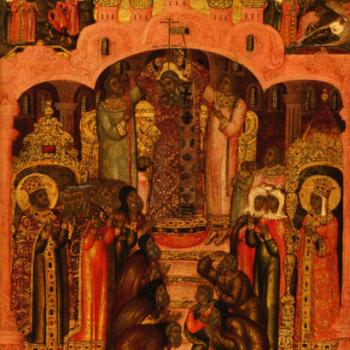
Christians are told they are to overcome all their self-centered, selfish inclinations. They are called to die to the self so that they can truly love others, thereby following after Christ. They are told if they put into practice such self-denial, they will get a reward:
And Peter said, “Lo, we have left our homes and followed you.” And he said to them, “Truly, I say to you, there is no man who has left house or wife or brothers or parents or children, for the sake of the kingdom of God, who will not receive manifold more in this time, and in the age to come eternal life” (Lk. 18:28-30).
So, what exactly does Jesus want from us, and why are we told to deny ourselves everything to follow after him, if we will be rewarded as he says? Does not the offer of such a reward encourage us to act for selfish reasons? Is there not some sort of contradiction going on?
Death to the self, denying oneself by taking up one’s cross and following after Jesus, must not be understood nihilistically. It is not about destroying ourselves, denying the good given to us as persons, seeking that good to eventually be eliminated from existence. It is rather about training ourselves to overcome our fallen, sinful inclinations, inclinations which are based, not upon the loving nature given to us by God, but rather, on the way we have developed a false sense of the self and made ourselves to be the ultimate good above all other goods. Such selfishness ultimately makes it impossible for us to know how to love others because all we love and worship is ourselves. We need to move beyond all particular attachments we might have in the world, especially attachments to ourselves, which hinder us from loving and being loved, that is, all those attachments which would hinder us from the state we need to be in to experience the kingdom of God and all its glory, which is the reward Jesus promises us if we truly follow after him.
Thus, self-denial, asceticism, can be said to be a therapeutic tool. We need to empty ourselves all thoughts of the false notion of the self we developed for ourselves. Likewise, we need to stop ourselves from all those forms of engagement we have developed which reinforce such thoughts. Ultimately, such self-absorption makes us individualistic, seeking to be above all ties to the world (who needs them, because we are, in ourselves, the absolute good?). Thus, cut off from everything, cut off from good, sound relationships with others, we do not really know how to act with others, to connect with them as subjects in their own right. They are objectified by us, and our interactions all serve to use them as tools for our own desires. While we will seek what we think will give us pleasure as a result of such objectification, what we get will never fully satisfy us. Until we understand the problem, we will find ourselves in a cycle, where we objectify more and more of the people around us, using them more and more as objects of our own pleasure, each time, finding no lasting satisfaction. For as we objectify others, we end up objectifying ourselves and using ourselves in the same fashion.
Thus, we must deny ourselves, deny the objectified, reified notion of the self which we have created as a result of our self-attachment; then, we can slowly detach ourselves from ourselves and find ourselves living life in a new way. We will find ourselves open to the world at large, acting, not out of selfish desire, but according to our proper nature, that is, in and through self-giving love. Then, we will be living as persons, open to the world around us, open to the love which others, including God, have to give us. Thus, we will be open to grace, allowing it to transform us and make us better, and in our betterment, we will find ourselves not holding onto that grace as if it were an object to be hoarded, but rather treat it as a gift to be shared by all, so that we will share it with others, allowing it to spread throughout the world and make everything better.
The Apostle Peter, of course, had to learn such radical self-denial; he had to turn himself over completely to God’s will, allowing God’s will to manifest itself in and through him. When he did so, he did not seek his own annihilation, his own death; indeed, he sought to preserve his life so long as God desired him to continue to be in the world, which is why he could and would rejoice when he was freed from his imprisonment (cf. Acts 12:5-11). When he saw God’s grace was at work in his life, he knew that it was not given for himself alone, but rather, it was something he was to use for the sake of others. He was saved in order to continue his role in the church, to continue his evangelical mission, and spread grace throughout the world; and because he did so, even the instruments of his persecution, his chains, were transformed and became vessels of grace, bringing spiritual and physical healing to many who have come into their presence.
Paul also taught the value of self-denial, sometimes as an embrace of the cross, but sometimes through an examination of the positive development which emerges once one has turned away from selfishness: “Put on then, as God’s chosen ones, holy and beloved, compassion, kindness, lowliness, meekness, and patience, forbearing one another and, if one has a complaint against another, forgiving each other; as the Lord has forgiven you, so you also must forgive. And above all these put on love, which binds everything together in perfect harmony” (Col. 3:12-14 RSV).
When we are so attached to ourselves, we become prideful, and that pride has us lose sight of others and their needs. We become argumentative and boastful, trying to make ourselves look greater than everyone else around us. We find ourselves incapable of helping others unless we think there is something in it for us. We are called to put aside all such selfishness. We must die to the self to rise as persons in Christ, and once we do so, we will find all that we have given up is as nothing in comparison to what we shall gain. We hear this, of course, while we are still selfish, still self-seeking, and so we are encourage to follow after Christ because we desire the reward we are told we will receive. Thus, in a way, our selfishness encourages us to follow after Christ and do away with our selfishness; that is, our selfishness is in some way defeated by itself, even as death is defeated in and through the death of Christ. We will follow the path given to us for selfish reasons and slowly find ourselves denying ourselves, overcoming our selfishness, until at last, we find ourselves in the state of being which God desires for us, and there we truly will get the reward we have been promised but we will find our interaction with it and engagement with it will differ from the way we first envisioned it. We will be rewarded, but we will not hoard up all the rewards we receive for ourselves, rather, we will understand truly they are best when shared, helping others attain what we have attained.
Stay in touch! Like A Little Bit of Nothing on Facebook.
If you liked what you read, please consider sharing it with your friends and family!












